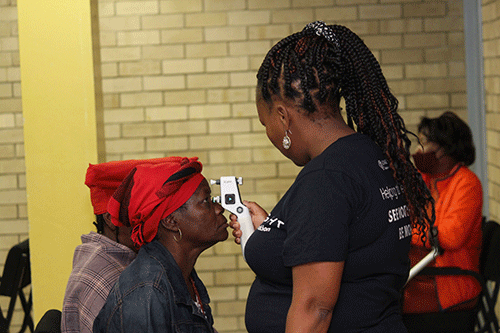OneSight EssilorLuxottica Foundation says it aims to make sustainable eyecare vital and ensure the elimination of uncorrected poor vision in a generation through an innovative approach to impact philanthropy, sustainable access creation, partnerships and raising awareness.
Mustapha Njie, director of OneSight EssilorLuxottica Foundation Programmes in Africa stated this at the One Sight Namibia Eye Campaign at the Central Hospital in the capital recently. The campaign, initiated by One Sight, was offering free eye screening to the public.
“Globally, 2.7 billion people are visually impaired and require vision care, and most of them do not have access to that type of healthcare. Hence there is a need for sustainable eyecare – and at OneSight EssilorLuxottica Foundation, we are here to solve this vision care crisis,” he said.
The France-based foundation believes that seeing well improves everything in life – from an individual’s health, education and work opportunities to the sustainable development of local communities and economies.
“Our main approach here is philanthropic so that we can help the people who don’t have access to eyecare – and while doing that, we are also trying to find out if we do the sustainable solution in Namibia. We are committed to providing eyecare to the people of Namibia, and we will continue to engage with the relevant stakeholders in Namibia to establish the best solution,” expanded Njie.
During the one-week screening at the hospital in Windhoek, the team of 21 volunteers from four African countries managed to assist 1 247.
The group’s target for the week was 1 200. Of that figure, it has been confirmed that 900 Namibians got free glasses after the examination, with some requesting to return on 14 October 2022, as their preferred eyewear would come from South Africa.
One of those is Avia Shomwele, a nearsighted Windhoek resident, who said this is a great initiative by OneSight and wholeheartedly thanked them for their philanthropic deed.
“Eyecare in Namibia can be costly. I cannot see far-away objects. It makes things difficult, especially reading at night or even driving,” shared Shomwele.
He told New Era although he can afford the glasses, he wants to see how the system of eye testing works and was happy to be reaffirmed of his poor eyesight.
The 24-year-old started experiencing vision problems at the age of 16.
An inmate, accompanied by the police, told New Era how happy he was to receive glasses to ease and aid his sight.
“I lost my glasses in prison. I have myopia. I do not know how I got it. Maybe I inherited it. I do not know. I am in a dark cell and have little access to sunlight, so the glasses will help me a lot,” he said.
Deputy executive director of the health ministry Petronella Masabane said that the ministry, they have tried several ways to cater to Namibians who are in dire need of glasses. She considers the deed by OneSight as noble and heartwarming philanthropy.
The main causes of vision impairment are uncorrected refractive errors, cataracts, age-related macular degeneration, glaucoma, diabetic retinopathy, corneal opacity and trachoma.
The OneSight team informed this reporter that the majority of the patients having their eyes examined during the one-week screening showed refractive errors.
– psiririka@nepc.com.na


